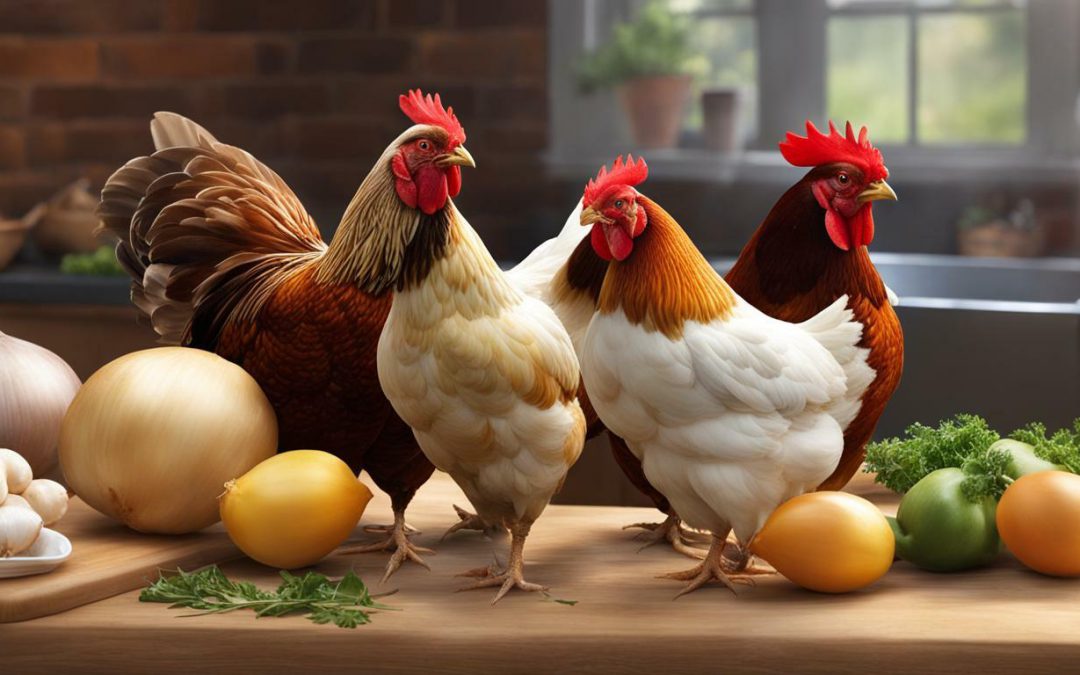If you’re wondering whether chickens can eat onions, you’ve come to the right place. In this comprehensive poultry feeding guide, we’ll explore the safety of feeding onions to chickens and provide expert advice on incorporating them into your chicken’s diet.
Key Takeaways:
- Onions are safe for chickens to eat in moderation.
- Feeding onions to chickens can cause their eggs to have an onion smell and taste.
- Raw onions should be cooked before feeding to chickens.
- The bulb and the white part above the soil are the edible parts of onions for chickens.
- Onion peels and stalks should be avoided.
- Different types of onions have different flavors and sulfur content.
- Onions can provide nutritional benefits for chickens, including vitamins, minerals, antioxidants, and carbohydrates.
- Feeding onions to chickens should be done in moderation, with 1-2 onions per week being sufficient.
- Chicks or young chickens may have a more sensitive digestive system when introducing onions.
Onion Consumption for Chickens: Benefits and Risks
Before feeding onions to your chickens, it’s important to understand the potential benefits and risks associated with onion consumption for these feathered friends. Onions can provide various nutritional benefits for chickens, including vitamins, minerals, antioxidants, and carbohydrates. However, they also contain traces of sulfur, which can be harmful in large quantities.
Feeding onions to chickens can result in their eggs having an onion smell and taste. To avoid this, it is recommended to cook the onions before feeding them to your chickens. Raw onions can be harmful to chickens and may cause digestive issues. It’s important to only feed them the bulb and the white part of the onion that grows above the soil, while avoiding the peels and stalks.
Different types of onions have different flavors and sulfur content. Yellow onions, for example, have higher levels of sulfur compared to other varieties. It is crucial to feed onions to chickens in moderation, typically 1-2 onions per week, to prevent any adverse effects. Additionally, when introducing onions to chicks or young chickens, be cautious as their digestive systems may be more sensitive.
| Benefits | Risks |
|---|---|
|
|
Summary:
While onions can be a beneficial addition to a chicken’s diet, it’s crucial to exercise caution and feed them in moderation. Cooked onions should be given to chickens, avoiding the peels and stalks, to prevent any digestive issues and unwanted onion flavor in their eggs. Remember to consider the sulfur content and the sensitivity of young chickens when incorporating onions into their diet. By understanding the potential benefits and risks of onion consumption for chickens, you can provide them with a nutritious and balanced diet.
Feeding Onions to Chickens: Best Practices and Precautions
When it comes to feeding onions to chickens, there are some best practices and precautions to keep in mind to ensure the health and well-being of your backyard flock.
Onions are safe for chickens to eat in moderation. They contain beneficial compounds, but also traces of sulfur which can be harmful in large quantities. Feeding onions to chickens can cause their eggs to have an onion smell and taste. It is important to note that raw onions can be harmful to chickens and should be cooked before feeding. The edible parts of onions for chickens are the bulb and the white part that grows above the soil. Onion peels and stalks should be avoided as they are more difficult for chickens to digest.
Different types of onions have different flavors and sulfur content, with yellow onions containing higher levels of sulfur. It is recommended to introduce onions gradually into your chickens’ diet to see how they react. Start with small amounts and observe any changes in behavior or digestion. If your chickens show any signs of discomfort, such as diarrhea or decreased appetite, it may be a sign that onions are not suitable for them.
Feeding onions to chicks or young chickens
Care should be taken when introducing onions to chicks or young chickens, as their digestive system may be more sensitive. It is advisable to wait until they are older and their digestive system is more developed before offering onions as part of their diet. Always consult with a poultry veterinarian or expert for specific advice regarding the age and breed of your chickens.
To summarize, feeding onions to chickens can be done in moderation, with cooked onions being the safer option. As with any new food, it is important to monitor your chickens’ response and adjust their diet accordingly. By following these best practices and precautions, you can provide your backyard flock with a varied and nutritious diet while ensuring their health and well-being.
| Best Practices | Precautions |
|---|---|
|
|
Feeding onions to chickens can cause their eggs to have an onion smell and taste.
Nutritional Benefits of Onions for Chickens
Onions can offer a range of nutritional benefits for chickens, making them a valuable addition to their diet when fed in moderation. They are rich in vitamins, minerals, antioxidants, and carbohydrates, all of which contribute to the overall health and well-being of your poultry.
When chickens consume onions, they gain access to important vitamins such as vitamin C, B vitamins (including folate, thiamine, and riboflavin), and vitamin K. These vitamins play a crucial role in supporting the immune system, promoting healthy growth and development, and aiding in the production of eggs. Additionally, onions contain minerals like potassium and manganese, which are essential for maintaining proper body functions in chickens.
The antioxidants found in onions, such as quercetin and sulfur compounds, can help protect chickens’ cells from damage caused by free radicals. This can contribute to improved overall health and increased resistance to disease. Onions also provide carbohydrates, which serve as a valuable energy source for chickens, promoting their vitality and productivity.
It is important to note that while onions can provide these nutritional benefits, they should be fed to chickens in moderation. Aim to include 1-2 onions per week in their diet, ensuring that the onions are properly prepared before feeding. Raw onions can be harmful to chickens, so it is best to cook them before offering them as a treat. Additionally, it’s essential to avoid feeding chickens the peels and stalks of onions, as these parts may be indigestible or contain higher levels of potentially harmful compounds.
| Onion Type | Flavor | Sulfur Content |
|---|---|---|
| Yellow Onions | Strong, pungent | High |
| White Onions | Mild, slightly sweet | Moderate |
| Red Onions | Mild, slightly tangy | Low |
When introducing onions to chicks or young chickens, it is important to be cautious as their digestive systems may be more sensitive. Start by offering small amounts and closely monitor their response. If any negative symptoms or changes in behavior occur, it is advisable to discontinue feeding onions and consult a veterinarian if necessary.
In conclusion, while onions can provide valuable nutritional benefits for chickens, it is crucial to feed them in moderation and take precautions to ensure their safety. By incorporating onions into their diet, you can contribute to the overall health and well-being of your flock.
Onion Varieties and Considerations for Chickens
Not all onions are created equal when it comes to feeding them to chickens. Understanding the different onion varieties and considerations for specific age groups is important for ensuring the health of your flock.
Yellow onions: Yellow onions are the most common variety and contain higher levels of sulfur compared to other varieties. If you decide to feed yellow onions to your chickens, it should be done in moderation due to their higher sulfur content.
Red onions: Red onions have a milder flavor and lower sulfur content compared to yellow onions. They can be a suitable option for chickens, but again, should be fed in moderation.
White onions: White onions have a similar flavor profile to yellow onions but contain less sulfur. This makes them a safer choice for feeding to chickens, but as with all onions, moderation is still key.
Considerations for Different Age Groups
When introducing onions to chicks or young chickens, it’s important to be cautious. Their digestive system may be more sensitive, so it’s best to start with small amounts and monitor their reaction. Gradually increase the quantity as they mature and their digestive system develops.
For adult chickens, 1-2 onions per week is a reasonable amount to feed. This allows them to enjoy the nutritional benefits without overloading their system with excessive amounts of sulfur.
| Onion Variety | Sulfur Content | Best Feeding Practices |
|---|---|---|
| Yellow Onions | High | Feed in moderation |
| Red Onions | Moderate | Feed in moderation |
| White Onions | Low | Feed in moderation |
Remember, onions should always be cooked before feeding them to your chickens. Raw onions can be harmful and cause digestive issues. Additionally, it’s important to avoid feeding onion peels and stalks to your chickens, as these parts can be difficult for them to digest.
By understanding the different onion varieties and considering the age of your chickens, you can ensure their health and well-being when adding this flavorful vegetable to their diet.
Conclusion
In conclusion, chickens can safely eat onions in moderation, but there are important guidelines and considerations to follow to ensure their well-being.
Onions contain beneficial compounds for chickens, such as vitamins, minerals, antioxidants, and carbohydrates. However, they also contain traces of sulfur, which can be harmful in large quantities. It is crucial to feed onions in moderation to prevent any negative health effects.
To safely feed onions to chickens, it is recommended to cook them before giving them to your flock. Raw onions can be harmful to chickens and may cause their eggs to have an onion smell and taste.
When feeding onions to chickens, it is important to only give them the edible parts of the onion, such as the bulb and the white part that grows above the soil. Onion peels and stalks should be avoided as they can be difficult for chickens to digest.
It is also worth noting that different types of onions have different flavors and sulfur content. Yellow onions, for example, have higher levels of sulfur. As a result, it is advisable to introduce onions gradually and monitor your chickens’ response to ensure they tolerate them well.
When introducing onions to chicks or young chickens, extra caution should be taken as their digestive systems may be more sensitive. It is always best to consult with a poultry expert or veterinarian for specific feeding guidelines.
By following these guidelines and considering the well-being of your chickens, you can safely incorporate onions into their diet, providing them with additional nutritional benefits while keeping them healthy and happy.
FAQ
Can chickens eat raw onions?
Feeding raw onions to chickens can be harmful. Onions should be cooked before feeding to chickens.
What parts of the onion can chickens eat?
Chickens can eat the bulb and the white part that grows above the soil. Onion peels and stalks should be avoided.
Do onions affect the taste of chicken eggs?
Yes, feeding onions to chickens can cause their eggs to have an onion smell and taste.
How often can I feed onions to chickens?
Feeding onions to chickens should be done in moderation. 1-2 onions per week is sufficient.
Are all onion varieties safe for chickens?
Different types of onions have different flavors and sulfur content. Yellow onions contain higher levels of sulfur.
Can I feed onions to chicks or young chickens?
Care should be taken when introducing onions to chicks or young chickens, as their digestive system may be more sensitive.

